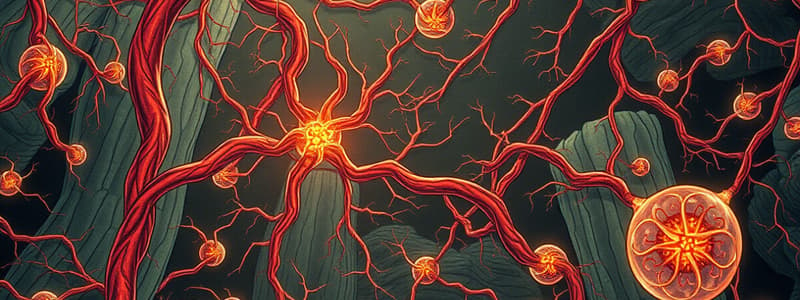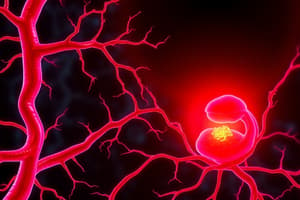Podcast
Questions and Answers
What is the initial step in scar formation?
What is the initial step in scar formation?
- Cell proliferation
- Deposition of connective tissue
- Formation of granulation tissue
- Inflammation (correct)
Which cells are primarily responsible for the formation of granulation tissue?
Which cells are primarily responsible for the formation of granulation tissue?
- Epithelial cells
- Endothelial cells
- Fibroblasts
- All of the above (correct)
Which mechanism of repair occurs when regeneration cannot restore tissue?
Which mechanism of repair occurs when regeneration cannot restore tissue?
- Hepatocyte proliferation
- Progenitor cell activation
- Angiogenesis
- Connective tissue deposition (correct)
What role do fibroblasts play in the healing process?
What role do fibroblasts play in the healing process?
During which phase of the repair process does angiogenesis occur?
During which phase of the repair process does angiogenesis occur?
What is a characteristic feature of granulation tissue?
What is a characteristic feature of granulation tissue?
What is the final stage in the scar formation process?
What is the final stage in the scar formation process?
Which cells contribute to the process of angiogenesis?
Which cells contribute to the process of angiogenesis?
What is the primary process involved in scar formation?
What is the primary process involved in scar formation?
What characterizes granulation tissue during the healing process?
What characterizes granulation tissue during the healing process?
Which mechanism primarily contributes to the remodeling of connective tissue after injury?
Which mechanism primarily contributes to the remodeling of connective tissue after injury?
What is a key role of fibroblasts in the healing process?
What is a key role of fibroblasts in the healing process?
Which process is associated with the formation of new blood vessels during tissue repair?
Which process is associated with the formation of new blood vessels during tissue repair?
Fibrosis often occurs as a result of which type of inflammation?
Fibrosis often occurs as a result of which type of inflammation?
In the context of tissue repair, organization refers to what?
In the context of tissue repair, organization refers to what?
What is the ultimate outcome of effective tissue repair?
What is the ultimate outcome of effective tissue repair?
What is a primary function of fibroblasts during the healing process?
What is a primary function of fibroblasts during the healing process?
Which process is primarily responsible for the creation of capillary tubes during angiogenesis?
Which process is primarily responsible for the creation of capillary tubes during angiogenesis?
What characterizes granulation tissue as healing progresses?
What characterizes granulation tissue as healing progresses?
Which statement about matrix metalloproteinases (MMPs) is true?
Which statement about matrix metalloproteinases (MMPs) is true?
In the context of wound healing, what role do myofibroblasts play?
In the context of wound healing, what role do myofibroblasts play?
What is the relationship between angiogenesis and connective tissue deposition?
What is the relationship between angiogenesis and connective tissue deposition?
What happens to the connective tissue as scar remodeling progresses?
What happens to the connective tissue as scar remodeling progresses?
What suppresses further endothelial proliferation and migration after scar formation?
What suppresses further endothelial proliferation and migration after scar formation?
Flashcards are hidden until you start studying
Study Notes
Angiogenesis
- Triggered by nitric oxide (NO) and vascular endothelial growth factor (VEGF), leading to vasodilation and increased vascular permeability.
- Pericytes separate from endothelial cells, allowing endothelial cell migration.
- Endothelial cells proliferate and remodel into capillary structures.
- Recruitment of periendothelial cells occurs to stabilize new vessels.
- Endothelial proliferation and migration are later suppressed, along with basement membrane deposition.
Deposition of Connective Tissue
- Involves fibroblast migration and proliferation for connective tissue formation.
- Increased synthesis of collagen and fibronectin, with a reduction in extracellular matrix (ECM) degradation by suppressing matrix metalloproteinase (MMP) production.
- As healing advances, fibroblasts transition to a more synthetic role and deposit ECM, essential for wound strength.
- Granulation tissue evolves into a scar, characterized by fibroblasts, dense collagen, and other ECM elements.
- Myofibroblasts participate in scar contraction due to their contractile properties.
Remodeling of Connective Tissue
- Connective tissue in scars undergoes continuous modification and remodeling.
- MMPs degrade collagens and other ECM components during scar formation.
- MMP activity is regulated by tissue inhibitors of metalloproteinases (TIMPs) to ensure remodeling balance.
- Wound contraction primarily occurs in healing by secondary intention.
Liver Regeneration
- Liver regeneration occurs via two mechanisms: hepatocyte proliferation and liver progenitor cell activation.
- Residual hepatocytes can compensate for resection of up to 90% of the liver.
- Liver progenitor cells assist in repopulation when hepatocyte proliferation is compromised.
- Growth factor-induced proliferation follows initial priming; proliferation halts once liver mass is restored.
Repair by Connective Tissue Deposition
- Repair occurs via connective tissue deposition when regeneration is insufficient, replacing injured cells with collagen-rich scars.
- Key steps include formation of a hemostatic plug, inflammation, and cell proliferation of epithelial, endothelial, and fibroblast cells.
- Granulation tissue formation follows, leading to final connective tissue deposition.
Tissue Repair Processes
- Injury initiates processes to restrict damage and prepare surviving cells for replication.
- Tissue repair involves two main processes: regeneration and scar formation.
- Regeneration allows for the restoration of tissue architecture using identical tissue.
- Scar formation involves laying down fibrous connective tissue without restoring original function, leading to potential fibrosis.
Fibrosis and Organization
- Fibrosis entails extensive collagen deposition due to chronic inflammation or localized ischemia.
- Organization describes fibrotic reaction within a tissue space filled with inflammatory exudate, such as in organizing pneumonia.
Studying That Suits You
Use AI to generate personalized quizzes and flashcards to suit your learning preferences.



